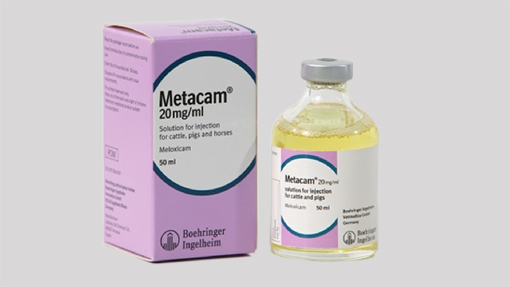Warning issued about fake vet med Metacam

Farmers are being warned about the risks of buying fake batches of the anti-inflammatory drug Metacam.
Metacam (pictured right) is a market-leading non-steroidal anti-inflammatory drug (NSAID) sold by pharmaceutical giant Boehringer Ingelheim.
It is used to treat a range of common inflammatory conditions in cattle, pigs and horses and for the control of post-operative pain in dehorned calves.
See also: Vet viewpoint: A regional round-up of key livestock issues
Boehringer Ingelheim is the marketing authorisation holder of the genuine product, which is sold as a 20mg/ml solution for injection for use in cattle, pigs and horses.
However the company warned that a presence of a counterfeit vial of Metacam injection has been identified in the UK and confirmed by the company.
A spokesman said: “The counterfeit vial carried a poor copy of the label, was made from a different type of glass, stopper and crimp-on cap and carried a false batch number and expiry date information.
“By alerting the market, Boehringer Ingelheim reminds vets and farmers that they should only buy Metacam from known and trusted sources.”
A source told Farmers Weekly that suspicions were raised about one bottle that was found on farm about six months ago because the packaging looked cheap and unlike normal Metacam packaging.
The source added: “It was not possible to establish where this bottle came from or how it arrived on farm but, as you would expect with a prescription product, after discussions with the Veterinary Medicines Directorate (VMD), an alert has been issued.”
Westpoint vet Jules Dare, based in Warnham, West Sussex, said Metacam was one of the main non-steroidal anti-inflammatories used throughout the company’s practices.
He said farmers should resist the temptation to buy imported Metacam products through online auction sites and Google searches because there was always a risk that such products could be fake.
Instead, he urged farmers to only use Metacam either bought under prescription from a vet or prescribed by a vet who has bought the product from a registered internet pharmacy.
Mr Dare stressed that the use of counterfeit Metacam in farm animals also increased the risk of animals getting ill, or worse still, consumers.
“If you use a counterfeit product, you don’t know if it will work or not,” he explained.
“There could be a health risk to the cow or even down the line to humans.”
Mr Dare said farmers who have concerns about any Metacam products they are using should report back to the vet they purchased the product from or contact Boehringer Ingelheim.
A spokeswoman for the Veterinary Medicines Directorate said: “The VMD is not aware of a widespread problem with counterfeit veterinary medicines. We’ve had one or two cases but nothing more. The VMD works closely with the pharmaceutical industry in tackling any perceived issues.
The VMD would like to endorse Boehringer’s advice to vets and farmers to report any suspicious packs to the company or to the VMD.
The authorised Metacam product is an injectable medicine for use in cattle, pigs and horses. Possessing a counterfeit product is an offence and carries additional risks in terms of product safety, efficacy and potentially harmful residues entering the food chain.
The VMD remind farmers that this is a medicine that requires a prescription from your veterinary surgeon. You should report any concerns to the VMD including adverse reactions observed in treated animals, or lack of efficacy.”
Any suspicious packs of this product should be reported to 01344 746 957 or vetenquiries@boehringer-ingelheim.com.
The image above shows a genuine bottle of Metacam
Read more stories like this
